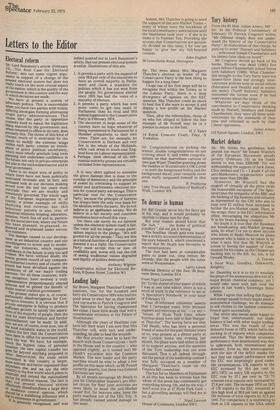Electoral reform
Sir: Lord Beaumont's article (February 15), 'The Real Case for Electoral Reform', sets out some cogent arguments in support of a change of the Present electoral system but does not really touch on the most crucial aspect of the matter, which is the quality of the government in this country and the way in which decisions are made.
We have at present a system of adversary politics. This is unavoidable When you have two parties with widely differing ideologies forming alternating single party administrations. This means that the party in opposition commits itself to repeal the legislation being enacted by the government and, When returned to office in its turn, does Precisely this. The threat of this kind of Change, much of it motivated by the desire to mollify the extreme wings Within each party, creates an atmosphere of grave political uncertainty, which must wholly preclude long term Planning and undermine confidence in the future, not only in private enterprise but also in the nationalised sector and in local government.
There is no major area of policy in Which there have not been politically motivated reversals and, in fact, any unbiased look at our decision making record over the last ten years must conclude that we are weakly and irresolutely governed. The whole saga of the European negotiations is, of course, a prime example of shilly. shallying and reversal but this behaviour pattern is also true of industrial relations, housing, education, taxation, North Sea oil and in, particular, the social services, where our future has been planned, re-planned, rePlanned and re-planned under successive ministers. The damage caused to our development as an industrial country and our unwillingness to invest and to modernise our industries, which requires confidence in the future, is only too-self evident. We have, without doubt, the lowest growth record of any comparable industrial country and of course, the Pound has been devalued against the currencies of all our major trading Partners. Yet all these countries, without exception, have evolved a truly rePresentative proportionately elected systems and so gained the benefit of stable central coalition government.
The present status quo is, of course, Particularly disadvantageous for Con
servative servative interests. It is obvious that f
Private enterprise is failing to produce s9fficient growth to satisfy the aspira tions of the majority of people, then the
case for state intervention and further nationalisation can be made. In addl.we are, of course, even now, one of toe most socialistic states in the world,
despite the fact that the Conservatives have been in office for seventeen years since the War. We have for example,
much the highest rates' of personal taxation; the new capital transfer tax goes far beyond anything proposed in Other democracies; the trade union Movement in this country is larger, more militant and better organised than
anywhere else and we are the only Country in the free world which plans to maintain and extend the nationalised that for political reasons. The fact is
mat .our present electoral system effectively ectively disenfranchises a large slice moderate central opinion, which rould be a stabilising influence and a bar to extremism in government.
`is generally recognised, and was indeed pointed out in Lord Beaumont's article, that our present electoral system is unfair. Illustrations of this are: 1. It permits a party with the support of only 39.6 per cent of the electorate to have an overall majority in Parliament and claim a mandate for policies which it has not won from the people. No government elected since 1935 has had the votes of a majority of electors. 2. It permits a party which has won more votes to get less seats in Parliament than its rival and this indeed happened to the Conservative Party in February 1974. 3. The electorate in large areas of the country have no hope whatever of being represented in Parliament by a Member sympathetic to their own views. There are, for example, no Conservatives in Durham and very few in the whole of the Midlands, while vast areas in south-east England have no Labour representation. 4. Perhaps, most obvious of all, substantial minority groups are virtually excluded from representation.
It is very short sighted to minimise the grave damage that is done to the concept of democracy and the principle of assent by continuing to support an unfair and anachronistic electoral system for cynical party advantage. This is particular true for the Conservative Party, because the principle of fairness has always been the only true basis for the idealism within the party. We do not believe in an egalitarian society. We do believe in a fair society and countless manifestos have echoed this view.
Yet there can surely be no fairness unless the electoral system itself is fair. The voter will no longer accept paternalism implicit in the pledge, "We will govern for all the people." They see this as a natural function of government and demand it as a right; the Conservative Party must accept this or lose all credibility and, worse still, run the risk of seeing traditional values degraded and dignity of politics destroyed.
Anthony Wigram Conservative Action for Electoral Reform, 6 Queen Street, London WI


































 Previous page
Previous page